American businessman Mr. West (Porfiri Podobed) has business in Russia but is terrified of the Bolsheviks. A gang of confidence tricksters (led by Vsevolod Pudovkin) use this paranoia to their advantage and try to drain him dry. A broad farce from Lev Kuleshov.
Stars and Socks Forever
We gain enormous insight from trying to ourselves as others do and that is probably the reason why I find the portrayals of Americans in non-American cinema to be intriguing. Perhaps the preoccupation is self-absorbed but Hollywood has always been free enough in its portrayals of non-American characters. Turnabout in fair play, after all.
A quick thought before starting. This is a highly political film and some film writers enjoy incorporating modern politics into their reviews. I personally prefer not to and generally try to avoid political topics newer than the Truman administration. So, if it seems that I am purposely avoiding drawing attention to modern parallels, well, I am.
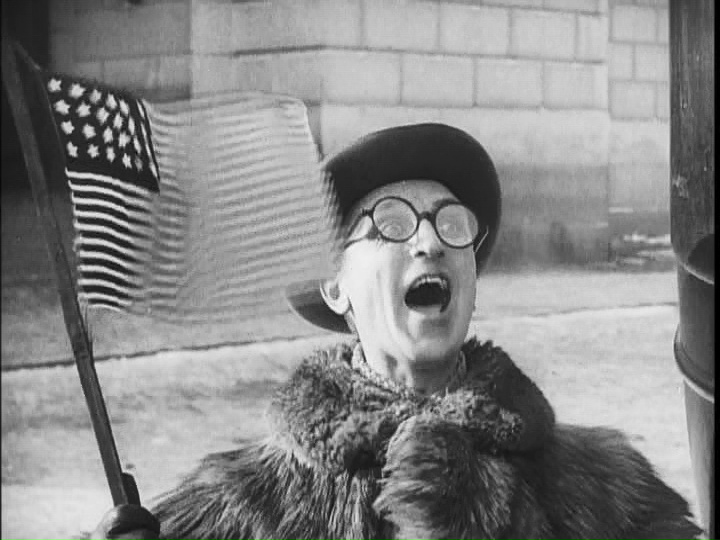
If someone is inclined to take offense at ribbing aimed at overt displays of patriotism, this is absolutely not the movie for them. If you find yourself accidentally viewing this film with such a person, I recommend distracting them with reruns of Walker, Texas Ranger while you make good your escape.
The movie starts with Mr. West (Porfiri Podobed) preparing for a trip to Russia. A bigwig with the YMCA (?), West has been warned that Russia is teeming with terrifying Bolsheviks. As a precaution, he takes along his cowboy pal Jeddy (future director Boris Barnet) as a bodyguard.
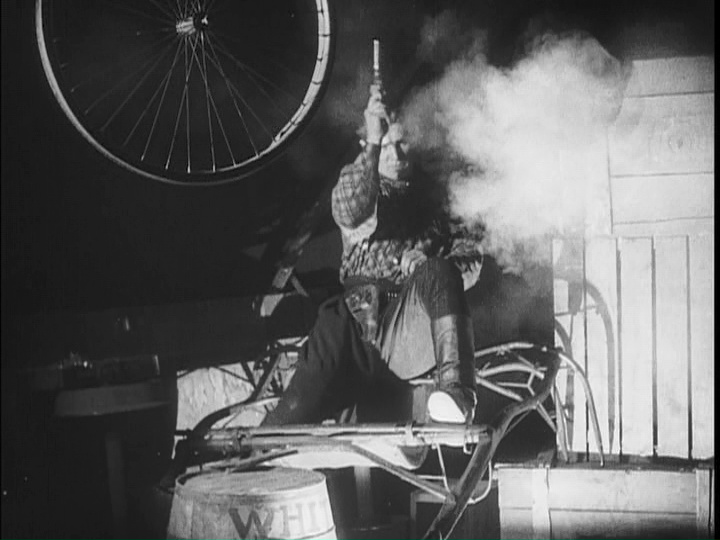
Once in Russia, West’s briefcase is immediately stolen and delivered to Zhban (Vsevolod Pudovkin, another future directing great), the leader of a gang of confidence tricksters. He is assisted by the Countess (Aleksandra Khokhlova) and we know she’s a countess because she writes her title on a wall in chalk letters half a foot high.
Meanwhile, Jeddy has become separated from West and ends up interrogating random pedestrians at gunpoint. Convinced that his employer has been kidnapped, Jeddy steals a sleigh and races through the streets of Moscow with the police in hot pursuit. The city is only saved from his rampage when he runs into Ellie (Vera Lopatina), an old friend and American ex-pat with a mean right hook.
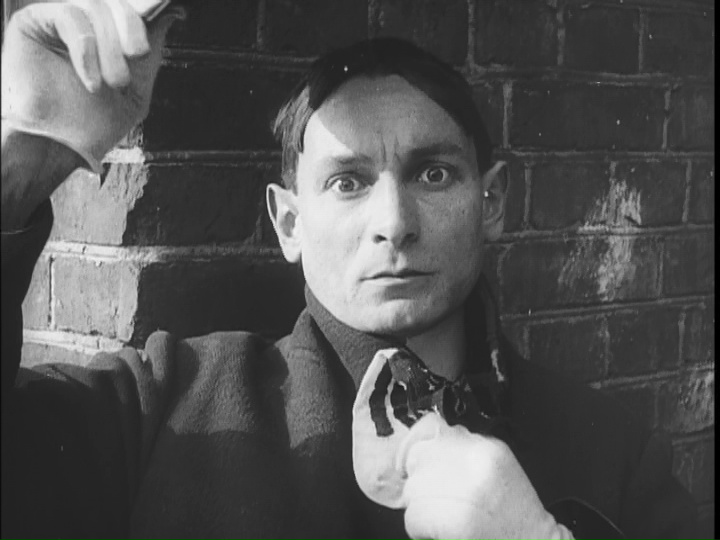
West has taken refuge inside an American office building but is called upon by Zhban, who has brought along the purloined briefcase. Does Zhban ever have a tale! He saw the briefcase being marched out of a Bolshevik prison when it fell off its sled. He opened it and there were socks, socks with the beautiful stars and stripes. Upon seeing this symbol, he was moved to take off his hat and pay proper homage. (Reader, I LOL’d.)
Such a patriotic, right-thinking Russian MUST be trustworthy! West agrees to leave with Zhban and during their journey, the conman points to assorted vacant lots and condemned buildings as the remnants of Russian culture.
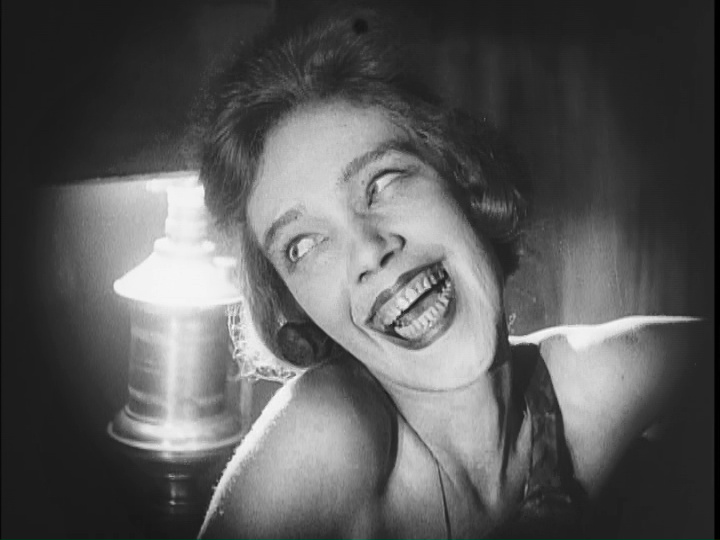
At the same time, Jeddy is being educated in real Russia by Ellie and realizes that he has been completely bamboozled by sensationalist propaganda. Now that he is sorted out completely, it’s time to rescue his hapless employer from his predicament.
Will they save Mr. West in time? You’ll have to see the movie to find out!

There is, I believe, always a risk in over-examining a comedy. As the famous saying puts it, it is like dissecting a frog: you learn something but the creature is dead. So, while film theory is important, I think it is wise to never lose sight of the humanity and the fun to be had in films and especially comedies. This film in particular, because it was the first feature-length showcase of Kulshov’s theories, was taken to pieces and bottled in formaldehyde decades ago. I hope to revive its carcass somewhat.
Kuleshov himself was, of course, a great dissector of frogs and an early film theorist and even film fans who are not particularly interested in technique have likely heard of the Kuleshov Effect. He was also a bit of an over-sharer and so there isn’t much mystery about the production and aims of this picture. In order to keep things interesting, I shall direct the discussion more toward the specific aspects of American films that make their way into this picture, as well as influences that I believe are generally overlooked when it is discussed. Also, we will consider how this picture works as just plain crowdpleasing entertainment, one of Kuleshov’s stated goals.
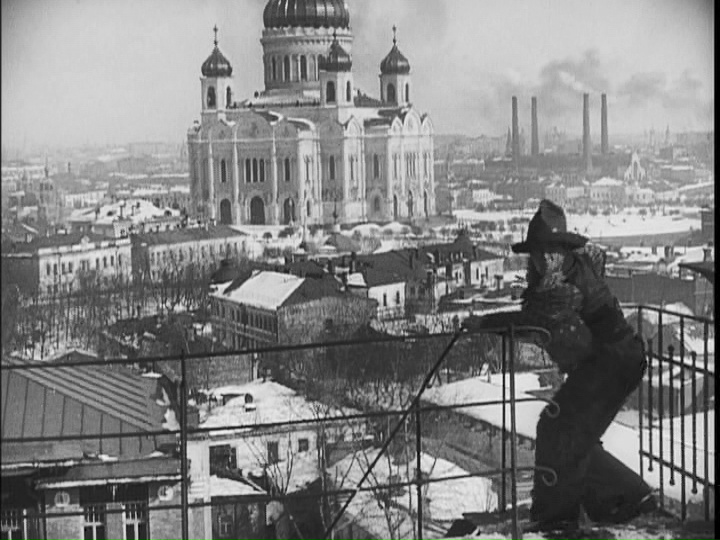
As I am fond of saying the Revolution basically had the Russian people jumping out of the frying pan and into the fire but that doesn’t mean the frying pan was pleasant. Anti-communist propaganda was indeed common and focused on prurient ideas such as the enforced sharing of one’s spouse.
Interestingly, though, the mainstream American motion picture industry was not gung-ho, at least not at first. (For the sake of brevity, I will be referring to it as Hollywood even if some of these pictures were made on the East Coast.) You see, a fair number of studio heads and film executives were of Jewish descent and they or their families had fled the harsh oppression of Czar Nicholas II and his father, Alexander III. This was a time of forced conscription, forced conversion and pogroms. As you can well imagine, this left them decidedly unsympathetic toward the collapse of the Russian monarchy. (Nicholas had better PR in this department and some even try to paint him as a sweetheart-type person but that’s your cue to bring up the Odessa Pogrom of 1905.)
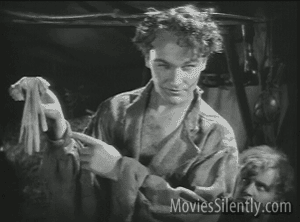
Lewis J. Selznick sarcastically wrote an invitation for the deposed Romanovs to come and star in his movies. (At the time, their fate was not known.) Even Thomas Edison’s film company made The Cossack Whip, which featured Viola Dana as a glamorous revolutionary/ballerina. Cecil B. DeMille’s The Volga Boatman, made almost a decade after the Revolution, put forth the idea that everything could have been solved with an inter-class single mingle.
Other Hollywood silent films about the Revolution tended to have the message “Hey, we don’t understand it either so we’ll just have the pretty people flee to Paris.” Revolutionary types tended to be men with wild hair and indeterminate political messages, described simply as “anarchists” or something similar. There were some Red Scare pictures, of course, most notably Bolshevism on Trial, but I think in general, modern audiences will be surprised by the way silent Hollywood handled the Russian question, especially in contrast to their 1950s counterparts.

As a film, Mr. West is concerned about refuting Red Scare propaganda but it is even more intrigued with the wholesale borrowing of Hollywood tropes and characters for its own purposes. Jeddy is perhaps the most obvious as he is essential Douglas Fairbanks’ character from Wild and Woolly transplanted to Moscow. In Wild and Woolly, Fairbanks plays an enthusiastic (but perhaps not too bright) young fellow who builds up a false view of the wild west and is quick to turn to comical violence when reality meets his expectations.
The parallels are so close that I would actually classify Jeddy as a copycat character and not a parody. This is, of course, not taking anything away from Boris Barnet as Fairbanks is a tough act to follow. A former boxer, Barnet certainly had the physical prowess for Fairbanksian antics and Kuleshov considered it essential for actors of have absolute control over their bodies and be ready for any stylized movements they were called upon to perform.
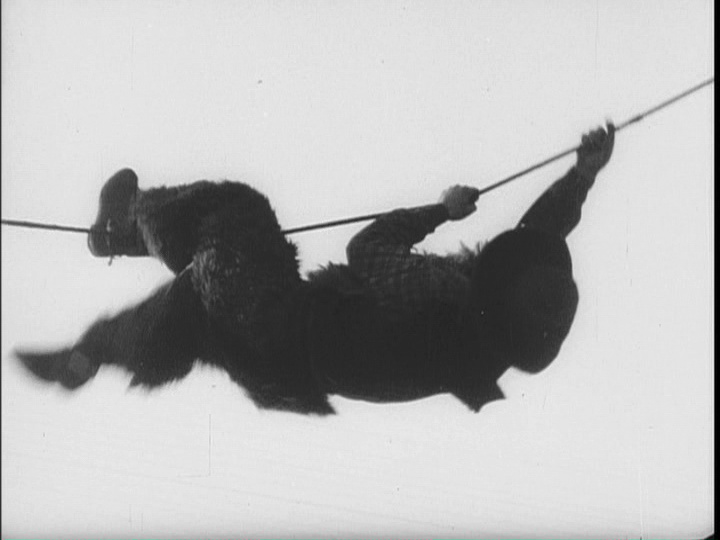
Kuleshov’s demands of mechanical perfection resulted in Barnet leaving the collective. Accounts differ but what is agreed upon is that something went wrong during the scene where Jeddy crosses between two buildings by shimmying along a wire. Barnet claimed he was left dangling while Kuleshov berated him, Kuleshov claimed he called for assistance immediately. Whatever the case, the men discontinued their collaboration after this film.

As the title character, Porfiri Podobed has perhaps the least interesting part in the film. Still, he is as game as the rest of the cast and throws himself into the comedy. While West’s glasses immediately call to mind Harold Lloyd, the character acts more like Creighton Hale, an Irish actor who went from leading man to bespectacled milquetoast character actor in major American productions. He played such a part in Way Down East and it is well known that Kuleshov admired D.W. Griffith. While Lloyd would display feistiness and even initiate scams and schemes, as well engage in derring-do, Hale’s character in Way Down East was a sad sack with fussy mannerisms. In short, Mr. West.
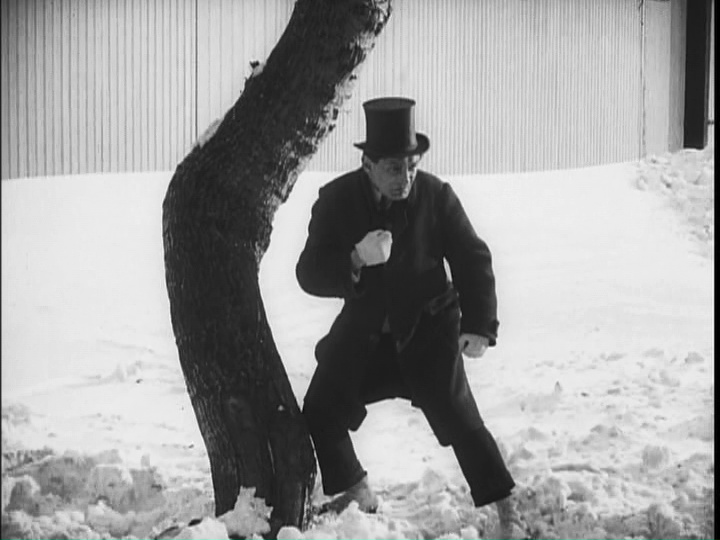
Vsevolod Pudovkin proves himself to be the MVP of the talented cast, along with Aleksandra Khokhlova. Considered one of the great directors of Soviet cinema, Pudovkin the actor was blessed with a memorable face ideal for the eccentric conman Zhban. His balletic movements and melodramatic gestures are kind of Ford Sterling meets Swan Lake and I love it.
I never thought I would compliment someone’s expressive teeth but, well, is there any other way to describe Khokhlova? All she has to do is deliver one of her wacky smiles and I am lost in peals of laughter. She also seems to be having the time of her life with her conwoman character trying to lure West into a honey trap. Well, it does look like a blast.

The controlled exaggeration of the cast works well because much of the humor in Mr. West comes from just slightly tweaking Hollywood conventions and adding a Russian twist. In fact, some of the more bizarre behavior in the picture seems to have been directly lifted from major American motion pictures.
The flag worship displayed by Mr. West is, of course, rooted in reality to quite an extent but we should also remember that the propaganda films of the First World War would have been a recent memory. They contained displays of jingoism that would have made Uncle Sam himself blush and ask for the filmmakers to tone it down a bit.
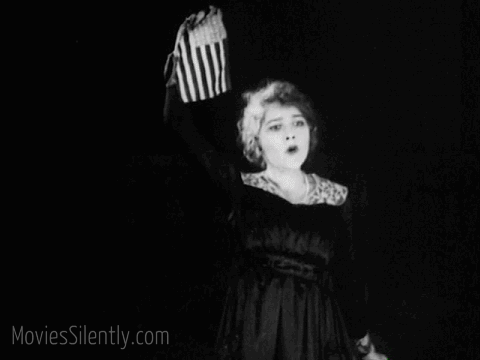
For example, in The Little American, Mary Pickford’s character is so patriotic that she managed to be born on the Fourth of July and demands stars and stripes-themed candy and presents for her birthday. One gift is a tiny American flag, which she waves furiously throughout the picture as a magical totem. The leap from this behavior and doffing one’s hat to flag socks is, well, it’s more of a tiny skip, really.

As for the socks, in The Heart of Humanity, Dorothy Phillips plays an expecting Canadian mother whose husband and brothers are abroad fighting the War. She is knitting socks for her unborn child but stops partway through to admire her handiwork and, overwhelmed by maternal feelings, she passionately kisses the socks. This was a rather coarse imitation of one of Griffith’s trademarks: the hot-blooded smooching of some symbolic inanimate object. Or bird, if you can catch one.

Finally, Ellie is introduced as a love interest for Jeddy and immediately enters the fray when he starts a fistfight. If there was one element that non-American films liked to emphasize in American girls, it was their penchant for violence in general and boxing in particular. (See The Oyster Princess and East and West, which both feature young American ladies using their talents for pugilism in order to get their way.) Interestingly enough, Cecil B. DeMille expressed concern about this in Manslaughter (1922), which features a scene of pearl-clutching at the notion of American debutantes drinking and boxing for kicks. And, of course, the serial queens of the 1910s would have also been in the collective pop culture consciousness.
Of course, we cannot say for certain which films Kuleshov and his collective watched but the fact that Mr. West mimics these elements so well cannot be entirely a coincidence. The movies mentioned are merely examples but they do provide, I think, a good core sample of how Hollywood portrayed Americans.
Further, the farcical flavor of this film is hardly a new invention or entirely taken from American motion pictures. Pre-Revolution Russian pictures dabbled in comedy with the best of them and The House in Kolomna is a close ancestor to Mr. West with its broad acting. (The staid direction on the other hand…) We should also think of Starevich’s The Cameraman’s Revenge, a tale of hypocrisy and adultery told entirely with dead insects. Granted, the creative personnel of these films had mostly fled but to state that Russian film comedy was unknown during this period is quite inaccurate. In any case, Russia has a wealth of humorous literature upon which to draw (The House in Kolomna was based on a poem by Pushkin) and I recommend the short stories of Anton Chekhov and the works of Nikolai Gogol for a start.
Descriptions of Kuleshov’s techniques would seem to indicate a harsh and cold comedy but that’s not exactly the case. In fact, Kuleshov unpacks his potpourri of cinematic influences with obvious relish and comes off as a child eager to share his treasure of buttons, string and marbles. While absolutely meant to appeal to mass audiences, there is, I think, some tangible joy in the material.

This picture is propaganda but of a more cheerful kind. The message of “If only we could meet without preconceptions!” has been played out again and again in both Russian and American cinema. (See The Russians Are Coming, the Russians Are Coming for a fine example on the American side. I must confess that, despite my love for Ernst Lubitsch, I am rather meh about Ninotchka.) It is naïve but appealing and as far as portrayals of American culture, this is really no more barbed than Lubitsch’s The Oyster Princess or the Yiddish film East and West.
The Extraordinary Adventures of Mr. West in the Land of the Bolsheviks is as broad as they come and slapsticky too. It is definitely aimed at a particular audience but that’s kind of what I am. It’s probably not for everyone but for those of you who like this kind of thing, this is the kind of thing you like.
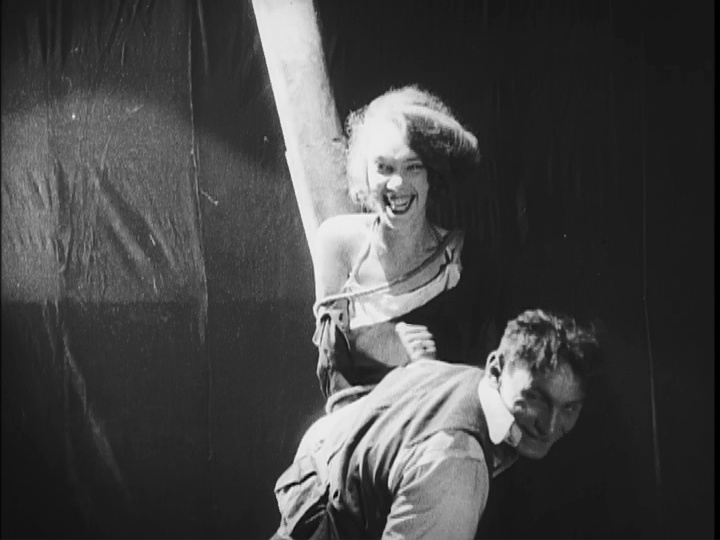
Where can I see it?
Released on DVD as part of the Landmarks of Early Soviet Film set from Flicker Alley. Highly recommended, by the way.
***
Like what you’re reading? Please consider sponsoring me on Patreon. All patrons will get early previews of upcoming features, exclusive polls and other goodies.

Thanks – an excellent review. I love this film.
😀
i’d be a little paranoid of the Countess myself.
😉
Thanks for another AMAZING post on the Barnet-Kuleshov-axis. I can’t get enough of Khoklova.
Glad you enjoyed! 😀